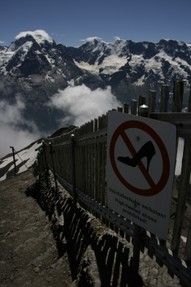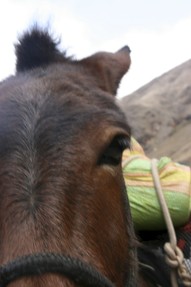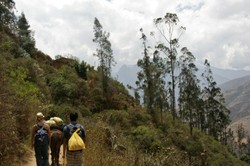Hiking and trekking in unknown territory can be invigorating by yourself or with your partner, but it can also be a bit dangerous. If you plan on trekking for several days or in a touristy area you may be confronted with the possibility of hiring a guide. I guess the question is not should you do it, but when?

Trekking without a guide—should you do it?
by Maia
The risks and rewards of blazing the trail without leaving a smoking hole in your wallet.
Trekking and hiking through the natural world is one of the most popular reasons for travel to foreign lands, and within our own countries as well. Getting to know the land, reconnecting with the environment, and finding the fresh air are all reasons why people want to discover new places. Normally we want to keep a budget in place while doing this discovery, and in recent times hiring a guide or joining a guided tour can be a hefty cost, especially if you require them to be English speaking. But how do you know whether or not it will be worth the money? Can you do it on your own instead? Here are a few ideas and tips to shed some light on the situation.
Are you trekking into Unknown Territory or are the trails well marked?
 First you need to consider what kind of wilderness you are hiking into: is it a national park or a well-known area that has been hiked by many people before you? Or is it relatively untouched wilderness with a few trails but not well marked? Are there campsites with facilities or little towns with restaurants and shops?
First you need to consider what kind of wilderness you are hiking into: is it a national park or a well-known area that has been hiked by many people before you? Or is it relatively untouched wilderness with a few trails but not well marked? Are there campsites with facilities or little towns with restaurants and shops?
If you are going without a guide you need to be sure to have a safety net within reach in case of an emergency. Locals with cell phones, for example, or a warm shelter in case of freak snowstorms (it has happened to me!). Even if you come well prepared it does not hurt to have some kind of basic civilization nearby if you are hiking for several days without a knowledgeable local.
If you want to hike and camp further into the wilderness without a guide, make sure you do your research well ahead of time to make sure you are not breaking any laws by camping. Ask the locals for advice on where to stay, if possible. Ask for a map of the area, or try to draw one out based on the local’s advice. And make sure you bring all the necessary safety equipment.
Basically, consider the safety risks of going too far out into the wilderness without a person who is guaranteed to bring you back.
Are you missing out on anything really important without a guide?
Some areas are simply too filled with new and exotic plants, animals or ruins to go without having someone describe them to you. For example, trekking the Amazon Basin alone, for me, was not an option. Because without my guide I never would have seen the seven different species of monkeys, three different breeds of macaws, the river otters or the caimans.

There’s some wilderness that is just too unfamiliar and secretive that unless you are with a local you will never see it all (and even then you won’t, but you’ll see a lot more than you would on your own!). In this case, it was definitely more than worth the money I paid for the guided tour.
Sometimes if you hike a well-known, touristy area without a guide you can make some friends that have some knowledge and tag along with them to learn about random monuments or flora and fauna. This happened to me several times in China, as the Chinese are soooo fond of being helpful to white women tourists traveling alone. I hiked a mountain with a very nice Chinese couple that spoke English who took me under their wings and taught me a lot about the Holy Mountains and their significance. I thought this was even more authentic than having a hired guide.
So, take into consideration the knowledge that a guide will bring to the trek and whether or not you can get that knowledge on your own.
Will you run into language barriers without a guide?
Another important consideration is the language spoken where you will be and whether or not you can communicate in it. If you do speak the language, you may be just fine going alone and relying on the locals if any necessary additional help is needed. If you feel a little rusty on your Spanish, French or Welsh, an English guide may be helpful. Some touristy areas may have English speakers here and there from whom you can get advice on where to stay or how to get to the next destination. But do some research ahead of time to make sure.
Does the guide come with a donkey and food supplies?
Sometimes with a guide you can manage much longer treks further into the wilderness. They can often provide a mule to carry the extra clean water and food supplies to sustain you for longer away from civilization. They can also make the trekking easier if they (or the mule) are carrying the tent and sleeping bags therefore allowing for a few extra days as well.

I have managed to rent a mule without the guide, but I had to make sure there would be people along the trail to help me pack and unpack the mule and feed it grass every night for a small tip. It was mostly worth it, except for the times I nearly got stuck halfway up the hills because “Salvadora” refused to move her stubborn hooves. Nice excuse to take a break though.
As always, make sure you pack your OWN safety gear and First Aid kit, even if you hire a guide and they bring one along too. If you get sick it’s nice to have familiar medicines on hand instead of relying on foreign pills.
Hiring Respsonsibly
If you decide your destination calls for a tour or the use of a guide, please don’t just spring for the cheapest one automatically. Do some research ahead of time and check various companies out online if possible. If you are paying someone money, you have every right to know where it is going and how it is being used. There are some big problems with unethical use of money, in South America especially. Ask these questions before handing over any cash or credit cards:
- What is included in the price of the trip?
- What additional expenses should I expect?
- What training do the guides have?
- Do the guides accept/expect tips?
- Do you have a policy that promotes minimal environmental impact?
One of the biggest issues with unethical tour operators is in Peru for the Inca Trail to Machu Picchu. Many tours use porters, and up until recent years the porters were treated very poorly, with very little pay, little food, inadequate clothing for the trek, and carrying way too much weight. This has become a known problem however, and many of the unethical companies have been shut down or have turned around their ideals. Keep this in mind though, especially in poorer, corrupt countries.
Happy Hiking!
No matter what your decision, pack smart, be safe and have fun!
You might also like
A Foreigner’s Guide to Tipping in the USAIf you're a foreigner in the USA and don't know how to tip, then here are fiv...
Travel toiletries: pack light, pack greenA backpacker's guide to choosing travel toiletries which are lightweight, con...



 Being a Solo Traveler- The ups, downs and all around iton 02/22/2012
Being a Solo Traveler- The ups, downs and all around iton 02/22/2012


Comments
Very good points here. There are some places in the world it is just not responsible to go without a guide.
I love hiking. But I tend to stick to trails with other hikers on it. That way if we get into trouble we can get some help.
Very good advice for anyone who wants to travel and see the world on foot.
Very good article on treks into the wilderness, Maia. As I live in a wilderness area (British Columbia), I would encourage people to do their homework just as you say, and not to do serious wilderness trekking totally alone. I have seen many instances of people ill equipped or unaware of some of the real dangers of an area. We have bears and cougars in our mountains, as well as avalanches, etc. A knowledgeable local could at least steer you away from areas where you are likely to experience serious dangers and to educate you on what to do if . . . . People have accidents, but most accidents could be prevented with a little fore knowledge. If you travel with a buddy, then at least one of you could get help if the other were to be injured.
yeah, I definitely agree, Sam. The more treks I do, the more confident I feel on my own... or with just a friend along. But I will probably hit my peak pretty soon and start to want guides again!
I think it depends also on your 'outdoor knowledge / skills' I have done some pretty 'wild' hikes alone but must say as I get older, I tend to be more careful.